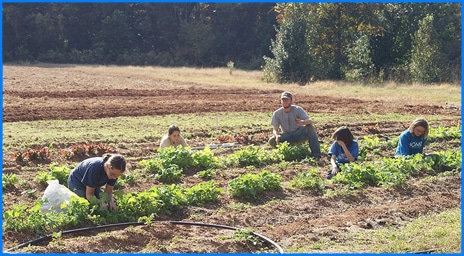
We talked about garden-based nutrition education, also known as garden-based learning, or GBL. We made connections between the benefits that kids derive from GBL, and the ways in which children can avoid falling prey to a crippling dependency on hedonic foodstuffs.
The Edible Schoolyard is based on the garden-based learning philosophy. It’s in Berkeley, California, at Martin Luther King, Jr. Middle School. It consists of a kitchen classroom and a one-acre garden where the students grow fruit and vegetables, herbs and flowers. Nearly 1,000 students are in the program, which is seen as exemplary. It attracts a lot of visitors, who go back to their hometowns with dreams of starting a similar program. A lot of them have succeeded.
The Chez Panisse Foundation sponsors The Edible Schoolyard (ESY), and then there is the Center for Ecoliteracy, which also funds it. The organization wanted an objective opinion on paper about how the program was succeeding. Harvard Medical School associate professor Dr. Michael Murphy and a research team evaluated ESY for two years and came back with answers. To have something to compare the results with, they have also studied another Berkeley middle school, one without a GBL curriculum.
The research team tested for student cooperation, behavior, and social skills. They found the Edible Schoolyard kids showing more pride in accomplishment, individual responsibility, and group solidarity. They took the trouble to ask open-ended questions, to get a sense of such intangibles as the students’ “sense of place” and “understanding of sustainable agriculture.” Going over the answers, they were excited by how deeply immersed in ecological literacy the GBL participants had become, to the point where they were enthusiastic about coming to school.
Sixty-four teachers from both schools filled out questionnaires about the “educational climate.” Among the kids, teachers, and adult volunteers, the research team described better “psychosocial adjustment,” and everybody felt safer. The researchers found in the school a nurturing environment where mutual respect flourished, as well as self-respect. They found kids with a spirit of community and a sense of the larger planetary community. There were hard numbers, too, like better test scores, especially in math and science. The report says,
As childhood obesity increasingly worries health experts, parents, and educators, they are interested in finding ways to get children to eat a more plant-based diet. The findings from this study suggest that teaching students about where food comes from and how it is prepared — along with changes in the food they are served and what they are taught about nutrition — may be an important contributor to overall diet change.
Murphy and the team found that the GBL kids were making much healthier food choices than their counterparts. This can only be a good thing. Kids who develop a taste for fresh, healthy food right from the start are less likely to be attracted by junk food, and may even be repulsed by it. There is a lot of anecdotal evidence for that among families where diet is taken seriously. And, of course, everybody’s got to eat something. If a person wants to avoid hedonic foods, then there had better be something else around to eat. Learning how to grow your own is a great advantage.
In Overweight: What Kids Say, Dr. Pretlow describes kids who are looking for stress relief in all the wrong places. Often they themselves realize that they are using large amounts of hyperpalatable food like a recreational drug, to cope with boredom, emotional upset, and other stresses of life.
In previous posts, we enumerated the ways in which the physical activity and psychological satisfaction of gardening can relieve stress. In setting forth the plan for recovery from food addiction, Dr. Pretlow describes techniques used by young people who have already been successful in unhooking themselves from this unhealthy dependence:
The kids learn to cope with life — sadness, stress, loneliness, and boredom — by substituting other things for the numbing pleasure and comfort of food. Many overweight and obese kids have never learned to cope with life’s pains, without seeking comfort and stress relief from food, or they have long ago lost those coping skills. Successful kids find soothing and stress relieving activities, such as non-competitive sports, pets, hobbies, books, musical instruments, volunteer work, counseling, calling a friend…
It’s always better to avoid a problem than to solve it. Everything that can be said about the usefulness of these strategies in healing food addiction goes double when it comes to prevention. In evaluating The Edible Schoolyard, Murphy’s analysis mentioned that the GBL kids become “more knowledgeable about natural processes.” In other words, they learn how the world works. The practical knowledge that the kids gain in many different areas of learning seems to cultivate confidence in their ability to master the larger issues of life. Whatever the mechanism, it seems to work.
Your responses and feedback are welcome!
Source: “About Us,” EdibleSchoolyard.org
Source: “Education for Sustainability: Findings from the Evaluation Study of The Edible Schoolyard” (PDF), Scoolfood.org, 04/03
Source: “Overweight: What Kids Say,” Amazon.com
Image by upturnedface, used under its Creative Commons license.

 FAQs and Media Requests:
FAQs and Media Requests: 












One Response